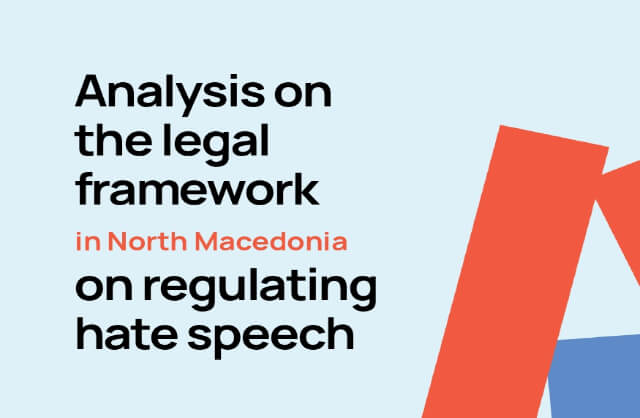ANALYSIS ON THE LEGAL FRAMEWORK IN NORTH MACEDONIA ON REGULATING HATE SPEECH

The hate speech trend in the Republic of North Macedonia is extremely concerning, and to a large extent, remainsunchecked. Ethnicity, sexual orientation, and gender identity are the main grounds for prejudices, and most victims and perpetrators are young people. Hate speech, including racism and homophobia/transphobia, is often used in the context of nationalist discourse, where ethnic, religious, and sexual minorities, as well as moderate politicians and human rights activists, are labeled as traitors and foreign agents. Hate speech by politicians remains common.
As in many other countries, the internet and social media have become the primary platform and source of hate speech, so racist and homophobic/transphobic hate speech is on the rise, especially through electronic forms of communication. Anonymous as well as non-anonymous inflammatory comments are predominantly present on social networks and in user-generated content, such as the comment sections of online news portals. The lack of willingness on the part of the owners of these portals and internet service providers to address this issue contributes to the persistence of hate speech.
Hate speech is particularly concerning because it often marks the first step towards real violence. An appropriate response to hate speech involves measures taken by the authorities responsible for law enforcement (criminal and administrative penalties, civil proceedings), as well as other mechanisms to address its harmful consequences, such as self-regulation, prevention, and counter-speech.
The Criminal Code lists several criminal offenses related to hate speech, including those committed through the internet. The Law on Audio and Audio-visual Media Services prohibits the broadcast of media content that incites or spreads discrimination, intolerance, or hatred. The Law on Protection and Prevention of Discrimination prohibits incitement to discrimination and harassment based on discriminatory grounds.
The purpose of this analysis is to examine the existing legal framework regulating hate speech and its adequacy in effectively combating this phenomenon, while also aligning with international agreements of the United Nations and the Council of Europe, as well as other relevant instruments for setting standards. This analysis utilizes the findings and recommendations of monitoring bodies, particularly the Council of Europe’s Recommendation CM/Rec(2022)16 on combating hate speech and the “General Policy Recommendation No. 15 on Combating Hate Speech” by the European Commission against Racism and Intolerance (ECRI), as well as broader international and European human rights standards. The analysis also includes reports from non-governmental organizations active in this field, such as the Helsinki Committee for Human Rights and ILGA Europe.
Additionally, the analysis encompasses comparative examples from other countries regarding hate speech legislation, especially in the context of addressing hate speech on the internet.



